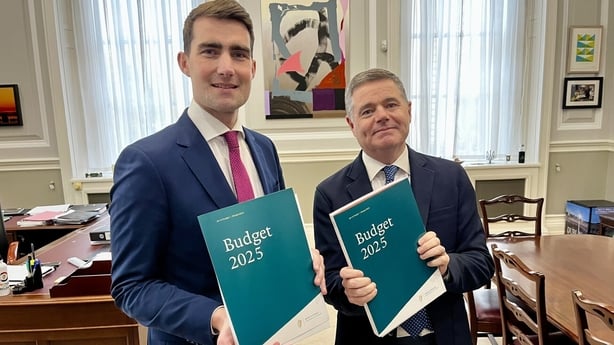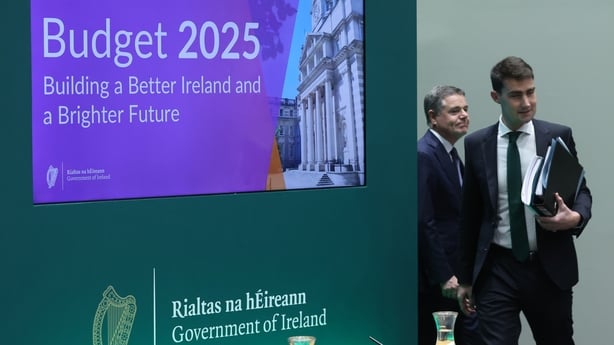Billed as a pre-election giveaway, there is a sense that this Budget is the most politically significant in many years.
Coming as it does so close to a pivotal general election which is between weeks and months away, it offered a chance for parties to claim the public's attention and set the tone for the campaign that awaits.
But what does it tell us about the state of play in Irish politics?
1. It's the cost of living, stupid
The rate of inflation might be falling, but people are feeling the pinch as much as ever since global events and the energy crisis began to drive up the cost of living.
If this Budget was all about the election, then the Coalition parties have calculated that the cost of living is set to be a major issue in that campaign.
Up until last week, the two money ministers were saying that the range of "one off" measures, mostly to be paid this year, would not be as big as recent years when inflation was rising at a higher rate.
But an expected €1.5bn cost-of-living package rose to €2.2bn (when hospitality measures are taken into account) by the time the ministers got to their feet.
That is not too far off the €2.3bn announced last year.
It will mostly come through €250 worth of energy credits and two double child benefit payments to be made in November and December.
With the ballot boxes coming into sharper focus, easing the squeeze on as many households as possible was seen as more politically profitable than anything transformational in how public money is used.

2. Jack be Nimble
He is the youngest Minister for Finance in a century, and there is a lot of focus on Jack Chamber's next move.
At 34 he does not carry the same political baggage that his party carries from the Celtic Tiger and economic crash years.
But as he got to his feet to deliver his first Budget, he did carry the future electoral hopes of many of its current TDs.
Mr Chambers is seen as having been both nimble and quick in how he rose through the ranks of Fianna Fáil since he was first elected in 2016.
While he gave little away about his political vision with the Budget, other than that it had the "common good at its core" and his delivery was not considered massively inspiring, his dealings with ministers and delivery of what backbenchers see as a very sellable Budget will have bolstered his chances of succeeding Micheal Martin as the next leader of Fianna Fáil.
3. Paschal: 'I’m still Prudent’
In contrast to Jack Chambers, the Minister for Public Expenditure, Paschal Donohoe, is a dab hand at these political set pieces, this being his ninth Budget.
While Minister Chambers spoke about looking to the future, Paschal Donohoe’s speech made a lot of reference to the past and, more specifically, how he steered the public finances from deficit to surplus, not once but twice.
He was also keen to point out that - for all the talk of giveaways - he was "not spending everything today, no matter how tempting".
His message that Fine Gael will continue a "steady approach" to its handling of the economy is a unique selling point that his party will use to differentiate itself from Fianna Fáil.
Expect still-prudent Paschal to drive that message home as polling day approaches.

4. The Gloves are Off
You would think with so much cash to splash there would be little need for arguing.
But there was an edge to these budget negotiations, with the Coalition parties vying for the mantle of the one who looked after your needs the most.
On the eve of the Budget, the Fianna Fáil leader Micheál Martin complained of "political mischief" and "phoney spin" when it was reported that Fine Gael was looking for an even higher increase in the pension than what was delivered.
As the election draws nearer competition between the Coalition parties will begin to heat up, and we can expect a lot more than mere mischief.
5. The Election is (almost) on
What this Budget really tells us about the current state of play in Irish politics, is that the election is coming.
The Budget was hardly announced when backbench TDs could hardly wait to bring their itchy feet out of Leinster House and on to the campaign trail.
The Fianna Fáil leader acknowledged as much while the Taoiseach Simon Harris – rather than saying it was next year – said there will be an election "in due course".
There are a couple of legislative hurdles to get through over the coming weeks, particularly the Finance Bill which is expected to be published next Thursday and could be rushed through in two week or three weeks, if needed, thereafter.
The Taoiseach travels to the White House next week and it is expected that talks among the Coalition party leaders on the timing of the election will begin after that.
By Halloween it could be all systems go, with a November election (the 22nd being the latest rumour).
Either way, with the Budget out of the way, the internal party pushes for an election will be like runaway train.
Be prepared for the ride.
Video by Sinéad Brennan and Mary Regan.





